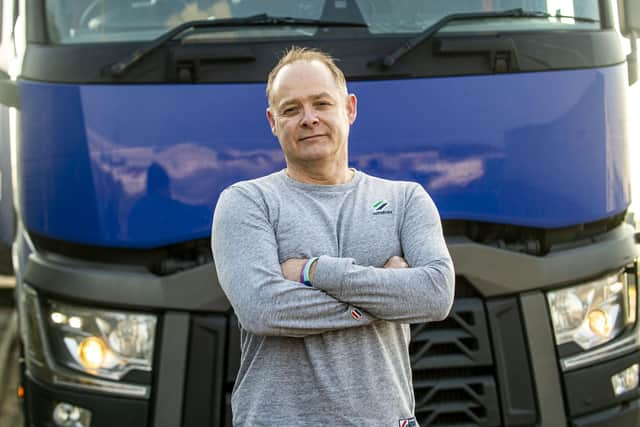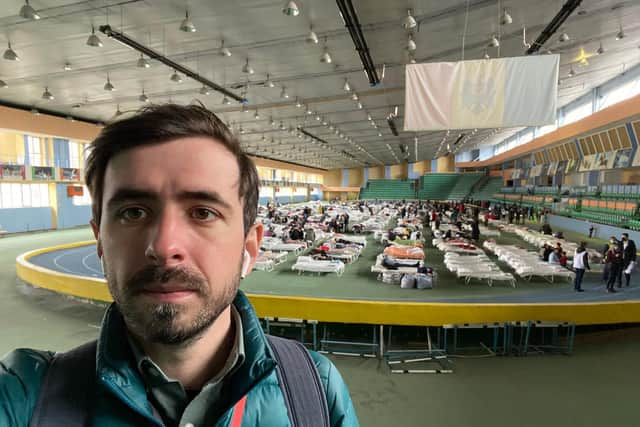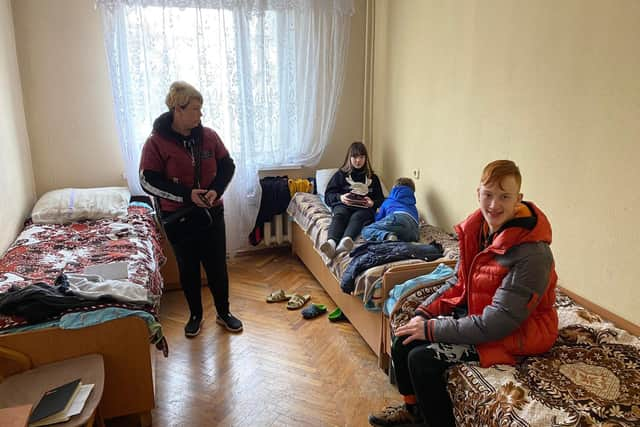Ukraine-Russia conflict: The Edinburgh HGV driver taking aid to Ukrainian refugees in Moldova
The HGV driver from Edinburgh has made the trip twice before – taking aid to the former Soviet nation, which is one of the poorest countries in Europe. This time, however, the aid is not for Moldova, it is for Ukrainian refugees, who have poured across the border since Russia’s invasion of the country three weeks ago.
Mr Marshall is to leave Edinburgh on Monday in one of his two HGV lorries, packed with toiletries and canned and dried food, collected from donation points in Edinburgh. The trip is his third to Europe in just two weeks. The other two journeys are part of his day job – he usually spends Monday to Friday each week travelling to France to transport commercial goods.
Advertisement
Hide AdAdvertisement
Hide AdHe says: "I've done it a couple of times, mainly to refurbish schools - to put in toilets and bathrooms and rewiring - and then we also take aid in the form of clothes, stuff to hospitals and stuff to orphanages. So even though this is dreadful, and this has popped up, we've done it all before.”


He is concerned about organisations which have collected items for refugees – but have no experience in shipping goods across Europe, such as navigating the borders or dealing with the tough Customs regulations which have come into force since the United Kingdom left the European Union.
"I’ve been reading about people who have collected all of this stuff, but they have no idea how to get it there,” he says. “I’ve seen videos of a place in Fife which was literally wall to wall with bags of stuff and they said they were looking for a haulier, but it’s not as easy as that.”
Two Morrisons’ supermarkets in central Edinburgh and St Augustine’s church on George IV Bridge are collecting much-needed goods for Mr Marshall to transport, as well as 18 boxes of toiletries donated by luxury Edinburgh hotel the Waldorf Astoria. He will also pick up some pallets of dried food at Heathrow Airport, sourced by the charity he has partnered with, England-based Teech.
He says: "It’s mainly food and toiletries and baby stuff, like nappies and wipes that we’re going to take – as well as blankets and sleeping bags. That’s what people in Moldova are telling us that they need - we're not just taking anything – it's what is necessary.”


"Some people have just been bringing us bags of clothes, which is difficult, because then we've got to sort through it all as some of it is not quite it's not suitable, shall we say? It's still the middle of the winter there. They need jumpers and that sort of stuff. They don't need bikinis and miniskirts, but unfortunately, that’s what some of the bags have in them.”
In Moldova, TV journalist Alex Gurdila has been working at centres set up in the Moldovan capital Chisinau, to host Ukrainian refugees. He agrees with Mr Marshall’s assessment of what aid is needed.
"I have seen some of the bags that have come, both from people inside Moldova and from outside and some of it is old clothes and things that people just can’t use,” he says. “Some people have obviously thought about what refugees will needs, hygiene products for women, nappies and so on, which is great, but what we really need is money.”


Advertisement
Hide AdAdvertisement
Hide AdHe says the authorities are struggling to cope with the wave of refugees. It is estimated there are around 100,000 Ukrainians in Moldova at the moment – a country of less than 3 million people. Buildings have quickly been adapted for use by refugees, including a restaurant, Smokehouse, in central Chisinau, whose owner has closed his business to set up as an open food bank facility for Ukrainians to take whatever they need.
While the tide has slowed for now, Moldova is bracing itself for when more people are able to leave besieged cities such as Mariupol, through humanitarian corridors – and seek safety in the country.
Mr Gurdila says: “The Prime Minister has told us that it costs something like $40 (£30) a day per refugee – and for a country that has GDP of $11 billion, that is a lot of money. We need help from western Europe. We’re not asking for money to grow [our economy], we are just asking for money to survive while we try to help people.”
He recalls meeting one Ukrainian woman with 14 children in her care – a mix of her own children, grandchildren and others she said she had adopted.


"They had come with just a couple of photo albums and nothing else,” Mr Gurdila says. “They had been sheltering in their basement of their house for two weeks and had eventually escaped with the help of some kind of Ukrainian soldier who was running away from the Russians and he got them to Odessa and eventually on to Moldova.”
While many refugees plan to move on from Moldova to countries elsewhere in Europe where they have friends and relatives - around 8,000 people a day are crossing the Moldovan border into Romania, which is a member state of the EU – Mr Gurdila believes others will stay.
"A lot of people from Ukraine don’t want to stay in Moldova, as we are a poorer country than them and I understand that,” he says. “But others have already said they will stay. No-one knows what will happen to the Ukrainian economy now, even after the war is over.”
A message from the Editor:
Thank you for reading this article. We're more reliant on your support than ever as the shift in consumer habits brought about by Coronavirus impacts our advertisers.
If you haven't already, please consider supporting our trusted, fact-checked journalism by taking out a digital subscription.
Comments
Want to join the conversation? Please or to comment on this article.
